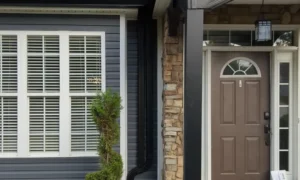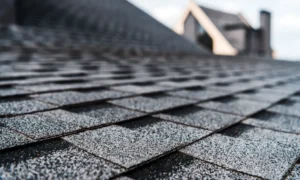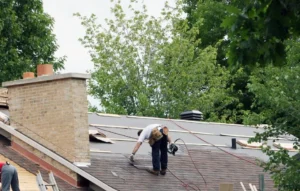
Rain gutters are more important than you might think they are. They can add a nice decorative addition to your home, but their primary use is to prevent mildew, mold, and other water damage. Gutters keep your home in place by redirecting rainwater from your foundation and siding. So are gutters necessary for your home?
Does everyone need gutters? Yes, but with a few exceptions. Below, Best Roofing explains what makes gutters necessary and explores how you can adjust them to fit your home’s style. In addition, we suggest homeowners consider investing in gutter guards to keep their gutters clean and functioning correctly.
What Do Gutters Do?
Clearly, gutters are placed under the roof’s edge to catch rainwater as it runs down your roof’s surface. The gutters direct the water to the edge of the roof and into vertical sectionals called downspouts.
Typically, downspouts dispense the water into a drainage system or other extensions of rain collection that relocate the extra water away from your home’s foundation.
Homeowners also have the flexibility to design eco-friendly gutter systems that move the water into buckets or tanks for gardening during your state’s dry seasons.
Are Gutters Necessary?
The short answer is yes. Though legislation doesn’t require gutters, they are necessary for most homeowners to prevent damage to their homes. Read about some of the critical reasons gutters are necessary below.
- Slopes: slopes and hills may give your landscaping an outstanding look, but this is one main reason you may need gutters. If your home was built at the bottom of hills, rainwater from the slopes could build up around your home’s foundation. This causes damage, mold, and settlement.
- Basements: You’ll want to install gutters if you have a basement, especially a finished one. If you have no gutters, water can enter the home and cause basement flooding. The same issue can happen in crawl spaces. A simple installation helps protect any special items you have in your basement.
- Overhang: If the overhang of your roof is close to your home’s siding, rainwater will cause trenches to start forming around your home’s foundation. Trenches will lead to severe and costly damage that gutters could have prevented.
- Clay-rich soil: Like red clay soil or clay loam soils, it absorbs and retains water when wet. The soil is capable of directing that water toward your home’s foundation, as it starts acting as a pipeline continuously delivering water to the same spot. Having gutters avoids these issues by running the water into a drainage system.
When Wouldn’t You Need Gutters?
Tennessee homes that don’t experience a lot of rainfall or snow usually don’t need gutters because the amount of water falling along the roof’s edge isn’t enough to require them.
Gutters are designed to protect against water damage for an extended period of time; if there isn’t a lot of water, that damage isn’t going to occur.
Suppose a house has stood without gutters for a long time and hasn’t experienced damage. In that case, a homeowner might assume that the house doesn’t need gutters. This is a reasonable assumption but must be backed with property inspections.
Homes in Tennessee are less likely to need gutters if the ground slopes away from the house. A home on a hill is not as likely to need gutters as one at the bottom would because the rain will naturally flow away. A house that’s surrounded by concrete may also not need gutters.
When Are Gutters Optional?
Gutters are usually required because of inspection or are highly encouraged. In some slim cases, gutters are optional. We’ve listed them below.
- Downward slopes: If your home was built on top of a hill, you might not have to worry about installing gutters. Water is more likely to naturally move away from your home if your landscaping and property feature a lot of downward slopes that point away from your home.
- Concrete: If you have concrete around your home, you already have a protective barrier from rainwater. Examples are sidewalks, driveways, streets, patios, and other concrete structures.
- Climate: Airy and dry atmosphere means less rainwater and puddling. Therefore, homes in regions with drier weather do not require gutters as much as homes in wetter climates.
- Long overhang: If your house has an overhang that is between six to 10 inches long, you might be able to avoid installing gutters depending on other factors, like landscaping and your local climate.
Gutter Problems and Solutions
Even though gutters help prevent significant problems, they can also create a few issues. However, these can easily be addressed and avoided. Please read over the most common gutter problems and the solutions below.
Clogging: Gutters are built with large openings, so debris like twigs, leaves, pine needles, moss, and pollen can build up over time. Birds and other animals can also use that built-up debris to build nests inside your gutter system. These nests can cause water clogs and water damage. However, you can fight this problem with routine cleanings and maintenance, or you can invest in a gutter guard system.
Ice dams: Many people believe gutters cause ice dams, but this problem is actually because of your attic and roof. When the snow melts and gets into the eaves of a sloped roof, it can potentially freeze there. This is what causes an ice dam or a buildup of ice. Because gutters are so close to your eaves, it appears to homeowners that the gutters are causing the ice dam. Routine maintenance of the attic’s ventilation and insulation, like clogs, helps you avoid this problem. Gutter guards that have heating elements can also help with the ice dams.
Maintaining Your Home’s Main Defense
When you don’t get your gutter system cleaned, you are letting problems in because clogged gutters can be just as bad as having no gutters. Rainwater gets trapped in a clogged gutter or downspout and has nowhere to go but over the edge of the trough, making your gutter system virtually useless.
Suppose the leaves, twigs, and other debris remain during winter. In that case, snowmelt can start to pool and refreeze in the gutter system. This can potentially weigh them down so much that they become loose from the house. As we mentioned before, clogged gutters also increase the risk of ice dams forming at the roof’s edge.
Traditional gutters on your home should be cleaned at least twice a year: one time in the spring and again in the fall before winter arrives.
With traditional gutters, you have two main maintenance options: You can carry a ladder over to each side of your house and clean out the debris with your hands, which saves you money but keep in mind this can be dangerous. Or, you can pay a professional gutter-cleaning crew to clear the gutters and downspouts.
Turns out there is a third option- this can save you from ever having to worry about your gutter system again. Instead of getting regular maintenance, you can alter the structure of your gutters. Install a seamless gutter system that never clogs and never needs cleaning.
Our Recommendation: When Gutters Are Necessary
We suggest looking into a gutter installation to ensure you make the right choice for your home. Not only can gutters add character to your home, but they also provide a ton of security and protection. While they may not be necessary for everyone, they are generally recommended.
We also recommend that you consider gutter guards to improve your system’s efficiency, reliability, and longevity. Gutter guards prevent clogged gutters and reduce the number of times you will need to schedule gutter cleanings.
Suppose you have old gutters that need repair. In that case, it may be time for a consultation from Best Roofing leaks or water-related issues could mean that your roof needs to be replaced or repaired rather than your gutters.
In certain cases, you may not need gutters—or it may be possible that you invest in an alternative. You can learn all you need to know through consultation with Best Roofing.
The Best Roofing team proudly serves the following places:
- Cities: Kingsport
- Counties: Hawkins, Washington, & Sullivan



